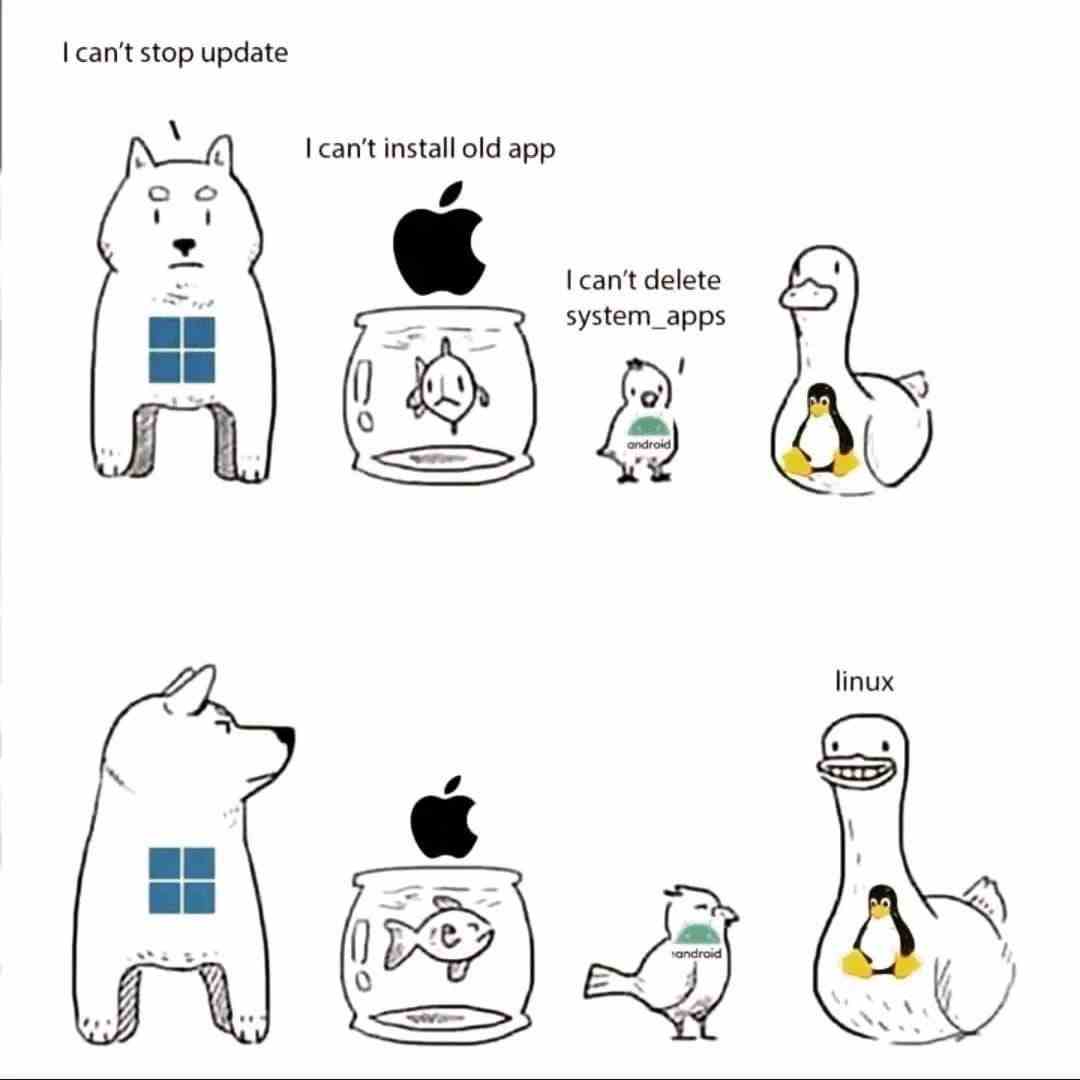this post was submitted on 25 Sep 2023
1143 points (92.3% liked)
linuxmemes
29831 readers
725 users here now
Hint: :q!
Sister communities:
Community rules (click to expand)
1. Follow the site-wide rules
- Instance-wide TOS: https://legal.lemmy.world/tos/
- Lemmy code of conduct: https://join-lemmy.org/docs/code_of_conduct.html
2. Be civil
- Understand the difference between a joke and an insult.
- Do not harrass or attack users for any reason. This includes using blanket terms, like "every user of thing".
- Don't get baited into back-and-forth insults. We are not animals.
- Leave remarks of "peasantry" to the PCMR community. If you dislike an OS/service/application, attack the thing you dislike, not the individuals who use it. Some people may not have a choice.
- Bigotry will not be tolerated.
3. Post Linux-related content
- Including Unix and BSD.
- Non-Linux content is acceptable as long as it makes a reference to Linux. For example, the poorly made mockery of
sudoin Windows. - No porn, no politics, no trolling or ragebaiting.
- Don't come looking for advice, this is not the right community.
4. No recent reposts
- Everybody uses Arch btw, can't quit Vim, <loves/tolerates/hates> systemd, and wants to interject for a moment. You can stop now.
5. 🇬🇧 Language/язык/Sprache
- This is primarily an English-speaking community. 🇬🇧🇦🇺🇺🇸
- Comments written in other languages are allowed.
- The substance of a post should be comprehensible for people who only speak English.
- Titles and post bodies written in other languages will be allowed, but only as long as the above rule is observed.
6. (NEW!) Regarding public figures
We all have our opinions, and certain public figures can be divisive. Keep in mind that this is a community for memes and light-hearted fun, not for airing grievances or leveling accusations. - Keep discussions polite and free of disparagement.
- We are never in possession of all of the facts. Defamatory comments will not be tolerated.
- Discussions that get too heated will be locked and offending comments removed.
Please report posts and comments that break these rules!
Important: never execute code or follow advice that you don't understand or can't verify, especially here. The word of the day is credibility. This is a meme community -- even the most helpful comments might just be shitposts that can damage your system. Be aware, be smart, don't remove France.
founded 2 years ago
MODERATORS
you are viewing a single comment's thread
view the rest of the comments
view the rest of the comments

I mean not really, Appimage has been around since 2004, flatpak/docker for about a decade now. But at any rate I don't see your point, the person I replied to said it's hard to run old applications on Linux and I gave him solutions on how to do that. What does their age have to do with anything?
I'm not sure if you're taking the piss but since those solutions are so recent, you won't find old applications packaged with those solutions.
They don't need to be packaged at the time of creation anyway, they can be packaged right now. Distrobox makes this easy, like let's say you need an application that only works on Ubuntu 18.04. It's two commands:
distrobox create --image ubuntu:18.04 ubuntudistrobox enter ubuntu -- sudo apt-get install _package_Then to export the package to your desktop you can even do
distrobox enter ubuntu -- distrobox export --app _application_Boom, you have an Ubuntu 18.04 application on an OS of your choosing. You can theoretically do this with any distro, distrobox can use any OCI images from docker-hub, quay.io, or any registry of your choice.
I wouldn't exactly call that easy, but compared to how it used to be, fair enough.